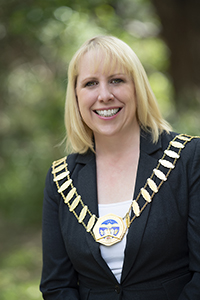Dr Michelle Byrne
 Dr Michelle Byrne
Dr Michelle Byrne
Mayor, Hills Shire
Hills Shire Mayor Dr Michelle Byrne need only drive around her fast-growing community for a reminder, if one were needed, of why she entered local government.
"I don't think it matters how small the achievement is," says the UNE alumnus. "It could be a footpath that makes life easier for a Mum pushing her pram, or the streetlights that contribute to road safety for motorists. These things may seem small, but they make a big difference to people's lives, and I take pleasure in knowing that we have delivered something of value to our community."
During 12 years as a Hills Shire councillor, including three stints as mayor and two as deputy mayor, Michelle has amassed many achievements to be proud of. She was the western Sydney shire's first popularly elected mayor and its youngest ever, at 33, and remains only the third female mayor in the council's 106-year history.
However, public life was not her first calling. Michelle studied biochemistry and molecular biology, and spent several years researching the drug resistance of cancer cells. "My grandfather, who I was very close to, died of cancer, and I've watched friends die, too," Michelle says. "When I was growing up I always wanted to be the world's greatest medical researcher and to find a cure for cancer."
Similar altruistic motives led Michelle to take a tilt at local politics in 2008. "I'd grown up in the Hills playing on its sporting fields, being involved in Girl Guides and a part of various community groups; I love the area," she says. "I wanted the same for my future children, to have a say in the decisions that would shape the area. That's why I got involved in council."
Michelle admits the first two years were difficult. "I had no idea what was going on; I didn't know what a DCP or an LEP was, and I was very new to politics," she says. "But then I started to find little things that I could do to make a difference, like footpaths and advocating for traffic lights, and pursuing local government's role in mental health. After that, it took off."
Job insecurity and ongoing funding challenges in medical research during that first term on council convinced Michelle she needed a back-up plan, so she enrolled to study law online at UNE. "I felt like I needed something in my back pocket, that gave me the flexibility to change industries if I needed to," she says. "The Bachelor of Laws was fantastic; I could listen to lectures and tutorials when it suited me, which was often late at night. I really enjoyed the course and the study."
Rising to the demanding position of mayor in 2012, Michelle found she had to forgo the full-time research position. "Funnily enough, being a mayor is not too dissimilar to being a medical researcher," she says. "I needed the same critical thinking, reasoning and budgeting skills, and I was well used to scratching around for grants. Both positions aim to improve the lives of others and deliver great outcomes for future generations, just in different areas."
A law degree added an extra professional dimension to her council work. "It's been very useful, especially when it comes to reading contracts and considering policies within the Local Government Act," Michelle says. "The legal skills I learnt, particularly in the first couple of years of the degree, I was able to apply straight away. I was admitted as a solicitor and I can always go back to that if I need to."
For now, council commitments and three children fill Michelle's busy days, plus the prospect that the Hills population is estimated to grow from 177,000 to 290,000 residents by 2036. "This presents challenges in terms of planning and providing enough infrastructure, and we have an important role to play in public policy decisions to support growth," she says.
Growth of another kind is also on the agenda, with Michelle keen to encourage more women to stand for local council. "Councils have been dominated by old white men for such a long time," she says. "When I joined I felt that I had to work twice as hard to earn the respect of my fellow councillors and to reach the level of mayor. When I was elected, I was one of three women out of 12, and I was the youngest by a long shot. We still only have four female councillors out of 13 today.
"Many women I speak to say they don't have the skills or confidence for a local government role, but they are the CEOs of their households and represent 50% of the community. We need to find ways, at all levels of politics, to make it easier for women to become involved."
While admitting that local politics is "not for the faint-hearted", Michelle relishes having a seat at the table and input into how the community she loves will function and look in the future. However, she wouldn't rule out entering state or federal politics "if the opportunity came up".
"But at the moment I love being involved in local government and the flexibility that comes with my role, because my three children come first," Michelle says. "I enjoy working at the grass-roots level. Serving your community is an absolute honour and privilege."
Words of advice:
If you are interested in a political career, then get involved through a political party or volunteer with your local council to learn what politics is about. Dream big and work hard, but always have a back-up plan. You'll need endurance, perseverance and determination because politics is a long road, but if it's what you really want to do, then go for it, and develop a thick skin fast.

